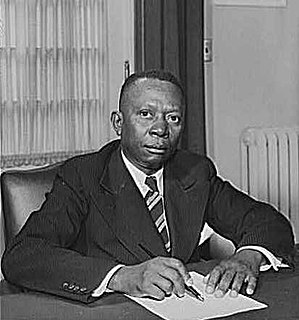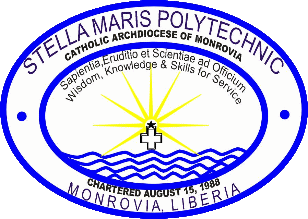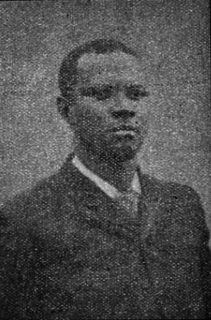
The President of the Republic of Liberia is the head of state and government of Liberia. The president serves as the leader of the executive branch and as commander-in-chief of the Armed Forces of Liberia.

William Vacanarat Shadrach Tubman was a Liberian politician. He was the 19th President of Liberia, serving from his election in 1944 until his death in 1971.

Garretson Wilmot Gibson was the 14th President of Liberia from 11 December 1900, to 4 January 1904. Born in Maryland, in the United States, his family emigrated to Liberia in 1845. After receiving an education in mission schools, he returned to Maryland to study theology. Ordained a priest, he served as rector of the Episcopalian Trinity Church in Monrovia. He also served as Chaplain of the Liberian Senate. Later, he served as President of the Trustee Board of Liberia College and at one time President of the College.

Arthur Barclay was the 15th President of Liberia, serving from 1904 to 1912.
Thomas Quiwonkpa (1955-1985), a Gio from Nimba County, was a Commanding General of the Armed Forces of Liberia (AFL) and founder of the National Patriotic Front of Liberia.
The University of Liberia is a publicly funded institution of higher learning located in Monrovia, Liberia. Authorized by the national government in 1851, the school opened in 1863 as Liberia College and became a university in 1951. The school is one of the oldest institutions of higher learning in West Africa and is accredited by the Liberian Commission on Higher Education. Civil wars have disrupted and damaged the school over the last three decades.
Clarence Lorenzo Simpson (1896–1969) was a politician in Liberia. He was Secretary of State during much of World War II (1934–1943) under President Edwin Barclay.

General elections were held in Liberia in 1903. In the presidential election Arthur Barclay of the True Whig Party was elected. He defeated former President William D. Coleman, who ran on the People's Party ticket. Barclay took office on 4 January 1904

General elections were held in Liberia in 1905. In the presidential election Arthur Barclay of the True Whig Party was re-elected. He defeated former President William D. Coleman, who ran on the People's Party ticket.

General elections were held in Liberia in 1907. In the presidential election Arthur Barclay of the True Whig Party was re-elected for a third term. It was the first time a President had been elected to a four-year term, as all had previously served for two years.

General elections were held in Liberia in 1927. In the presidential election, the result was a victory for Charles D. B. King of the True Whig Party, who was re-elected for a third term after defeating Thomas J. Faulkner of the People's Party.

General elections were held in Liberia in 1931. In the presidential election, the result was a victory for incumbent Edwin Barclay of the True Whig Party, who defeated Thomas J. Faulkner of the People's Party to win a first full term.

A constitutional referendum was held in Liberia on 7 May 1935, alongside general elections. The changes to the constitution ensured that President Edwin Barclay remained in office without the need for the presidential elections due that year. Although it was claimed to be for economic reasons, the government feared that an election may lead to instability that would lower confidence of foreign powers and creditors. The next elections took place in 1939.

Stella Maris Polytechnic (SMP) is a post-secondary, private institution of higher learning in Monrovia in the West African nation of Liberia. Founded in 1988, the school is owned and operated by the Roman Catholic Archdiocese of Monrovia. Located on Capitol Hill, the school has approximately 2,000 students. The school is recognized by Liberia's National Commission on Higher Education as an approved baccalaureate granting school of higher learning, and is a member of the Association of African Universities.
James Skivring Smith Jr. (1891–1950) was a Liberian politician who served as the 21st Vice President of Liberia from 1930 to 1944 under President Edwin Barclay. Prior to this, Smith served as superintendent of Grand Bassa County from 1924 to 1927. Smith was elected as vice president in a special election held in 1930 following the resignation of President Charles D. B. King and Vice President Allen Yancy after international accusations of government-backed slave labor at the Firestone rubber plantation in Liberia. Smith was the son of James Skivring Smith, who served as vice president and president of Liberia in the 19th century.

Joseph D. Summerville served as the 15th Vice President of Liberia from 1902 until his death in 1905 under Presidents Garretson W. Gibson and Arthur Barclay, making him the only person to serve as vice president under two separate presidents.
Nathaniel Varney Massaquoi (1905–1962) was a Liberian educator and politician, from the Vai community.

The 1980 Liberian coup d'état happened on April 12, 1980, when President William Tolbert was overthrown and murdered in a violent coup. The coup was staged by an indigenous Liberian faction of the Armed Forces of Liberia (AFL) under the command of Master Sergeant Samuel Doe. Following a period of transition Doe would go on to rule the country throughout the 1980s until his murder on 9 September 1990 during the First Liberian Civil War.
The following is a timeline of the history of the city of Monrovia, Liberia.











